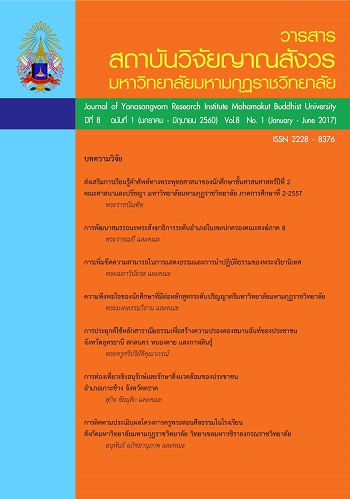A Teacher Development Model for Basic Education Institutes Based on the concept of Emotional Education of LamplaimatPattana School Model, Lamplaimat District, Buriram Province
Main Article Content
Abstract
The objectives of this dissertation were: 1. to study concept, theory, Dhamma principle and model in teacher development in basic education institutes based on the concept of emotional education of Lamplaimat Pattana School model in Lamplaimat district of Buriram province, 2. to develop the teacher development model for basic education institutes based on the concept of emotional education, and 3. to propose the teacher development model for basic education institutes based on the concept of emotional education. Mixed-method research design was used in the study. The documentary research was firstly conducted and followed by in-depth-interview with 9 experts and a focus group discussion with 8 experts. For quantitative research, the data were collected from 308 teachers and administrators of 50 schools through questionnaires. The results of the study found that: 1. The concept, theory, Dhamma principle and model in teacher development in basic education institutes based on the concept of emotional education of Lamplaimat Pattana School model in Lamplaimat district of Buriram province consisted of 5 factors; philosophy in teacher development, objectives in teacher development, principles of learning and developing, development process, and development evaluation. Each factor could be synthesized with Buddhadhamma principles as follows; The Threefold Training, Four Kinds of Persons, Teaching techniques of the Buddha, Qualities of Good Friends, Virtues for Fraternal Living, Virtues for lay people, Holy Abiding, Principles of service, Basis for Success, and Virtues of the Righteous. 2. A teacher development model for basic education institutes based on the concept of emotional education consisted of 5 components philosophy in teacher development, learning and developing principles, development process, and development evaluation. These 5 components were focused on thinking skills and knowledge searching process by both internal and external wisdom through emotional education process for helping the internal wisdom of the teachers and students, elevating using positive psychology and build communities and ways of communities. The highest target was the truth achievement, goodness and aesthetics for a completed human, a creating ways of life in educational institutions based on nature and to manage a learning process from mind base, intellectual base to control the assiduity with consuonsness and the right concentration. The purposes of teacher development were; 1. Vision of organization and individual, 2. Positive thinking, 3. Teamwork, 4. Teaching skills, 5. Organizational culture cooperation and 6. Professional teachers. The data were collected from documentary research, in-depth-interview, focus group discussion and questionnaires from analyzing teachers and administrators in 50 schools. The results of the optimal Model of the study were found that: there was average point at high level by analyzed in code aspect; In the highest level was objective at = 4.34 and the development process was at the lowest average point in high at level at = 4.0 3. A teacher development model for basic education institutes based on the concept of emotional education were classified into 3 parts; 1. Philosophy in teacher development, objectives, and learning and developing principles, Past 2. Development process and Buddhadhamma principles for teacher development, and 3. Development evaluation.
Article Details
References
สาโรช บัวศรี, รากแก้วการศึกษา: หนังสือ สุ จิ ปุ ลิ ๑๑, กรุงเทพมหานค: สำนักพิมพ์มหาวิทยาลัยศรีนครินทรวิโรฒ, ๒๕๕๒.
วิจารย์ พานิช. การเรียนรู้เกิดขึ้นอย่างไร, กรุงเทพมหานคร: เอส.อา.พริ้น ติ้ง แมสโปรดักส์จำกัด, ๒๕๕๖.


